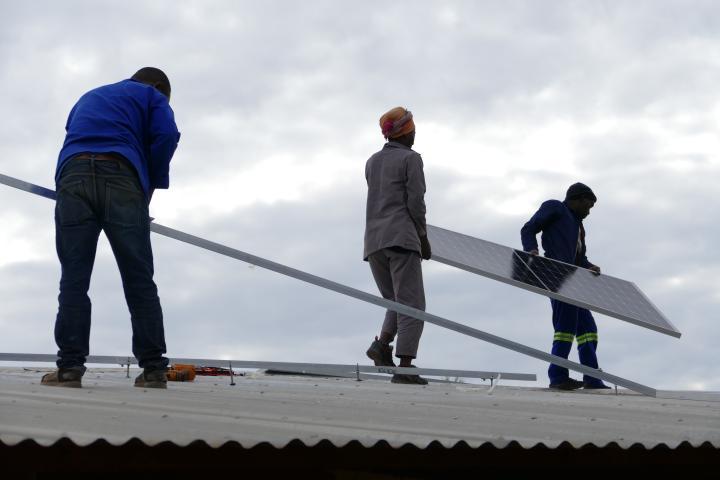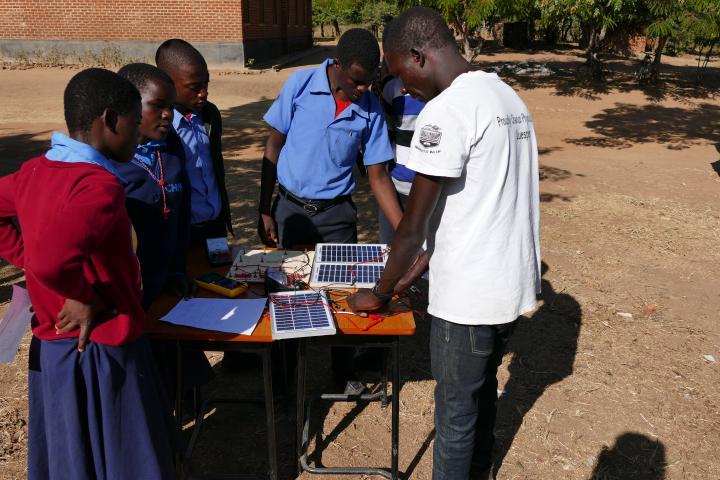German engineering students have been working to commission a photovoltaic (PV) solar-plus-storage system for a Malawi school that will power a digital library, electronic devices, adequate lighting and sanitary facilities. Despite restrictions resulting from the COVID-19 pandemic and multiple logistical challenges, the team completed key system elements in late 2022.

Globally about 1.3 billion children attend primary and secondary schools every day. But many of these schools lack an adequate learning environment that includes electricity, sanitary facilities or a comfortable physical workspace. For example, the United Nations Educational, Scientific and Cultural Organization (UNESCO) reports that in sub-Saharan Africa, only an average of 35% of schools have electricity. The grid infrastructure in rural areas, when there is one, is often underdeveloped. The best option is frequently an off-grid energy system that can be built to the specific requirements of each school.
Schools in the southeast African country of Malawi, one of the least electrified countries in the world, often fit this definition. Malawi ranks at the lower end of UNICEF’s Human Development Index, a measure of education, health and income. The United Nations (UN) lists education as one of its important sustainable development goals and an essential contributor to alleviating poverty and hunger. In Malawi, adults have completed an average of fewer than five years of school, and it’s not uncommon to see classes of 80 children in one room, often sitting on the ground.
Engineers Without Borders Germany (EWB) aims to improve the quality of school life in Malawi and create a safe environment for children through its Basic Services for Schools program. Generally, EWB’s work includes constructing school buildings, introducing solar energy or biogas to generate electricity, and providing water and sanitary facilities.
The Chambala School Project
Chambala, in the Kasungu district of Malawi, is typical of many schools in the country. Before EWB completed its work, there was no electricity in several new buildings, meaning children and teachers were limited to working only during daylight hours. Additionally, the sanitation facilities were poor, textbooks were scarce or obsolete, and students had no access to digital educational content.
In a recently completed project for Chambala’s primary and secondary schools, EWB and the Evangelical Lutheran Development Service provided a reliable power supply and improved sanitation facilities. Engineering student and project leader Christina Schlangen said she believes the new resources will significantly improve learning potential at Chambala.
“During a 2018 scouting trip, we saw that a new library was under construction for the secondary school, but notably, there was no power supply, so this was a priority for us,” Schlangen said. “We planned for an additional PV system with battery storage to provide the library with sufficient light and sockets for mobile phones and laptops for the teachers. We also planned a digital library so children could get access to updated textbooks that would be stored on servers,” she explained. EWB developed the digital library in collaboration with Next Generation Afrika — a German organization that creates digital libraries. Another top priority for EWB was developing a proper sanitation system for the primary school.
Changing circumstances in Malawi required creative responses
The German team described their time in Malawi as a series of challenges that required ingenuity, flexibility and innovative approaches. In 2018, team members made a scouting trip to Africa to research specifications for the new energy system and gather the requirements for modeling it in HOMER® Pro.
Nils Floeter, an engineering student who worked with Schlangen on the Chambala project, said that early research included determining classroom brightness levels based on German standards. The team then analyzed the required electrical loads to provide adequate lighting, electricity for charging phone and computer batteries, and power for the servers in the library.
“We go into a country, talk to all the people that are involved, and try to come up with a good solution so we don’t do any damage there,” Floeter said. “When the requirements are constantly changing, we have to be very creative and have good partners. We like to have these kinds of challenges!”
“We have to plan and implement a whole system, but it has to be realistic,” Schlangen said, “so the challenge is to find a compromise.”
After designing the system using HOMER Pro and waiting through a year-long delay due to COVID-19 restrictions, the team arrived in Malawi in the summer of 2022 to finalize the project. Their goal was to add 3.75 kilowatts (kW) of solar photovoltaic panels to the library and 14 kilowatt hours (kWh) of energy storage provided by lithium ferrous phosphate batteries.
The new library and laboratory building were to have been built in 2021. However, when the German team arrived in 2022, the buildings were not quite finished and had no floors. Additionally, contractors installed the wrong type of solar panels on the new library, which required redesigning the microgrid and purchasing a different kind of inverter. The EBW engineers discovered that currency fluctuations and the high United States (U.S.) dollar value required them to remodel the microgrid in HOMER Pro to be sure their financial calculations were correct.
“We had to do 20 or 30 different HOMER models before the project was finished,” said Manfred Busch, a senior engineer with Engineers Without Borders. “Aside from currency and supply chain challenges, we had to add several changes that people wanted. It was very useful to have HOMER Pro to analyze the new conditions on the spot, plus model the battery state of charge, so we could see when we should charge the batteries. For us, the focus was not necessarily cost, but safety, reliability and relevancy.”
“Working in this type of environment,” Busch added, “we have to be ready to improvise when things change. We must always be creative once we arrive on location.”
Community education was the final step

Aside from its construction project, Schlangen said that EWB conducted several education workshops at Chambala. After the energy project was commissioned, the engineers invited students, teachers and community members to workshops on solar energy.
Over the five-day program, participants learned about the structure of solar PV systems, the role of individual components, and design and financing issues. The engineers also planned hands-on sessions with practical experiments in electricity and wiring.
Since many town residents and children had no prior experience with electricity, safety rules and lessons on the dangers of working with electricity were critically important. To develop a team of people who could service and repair the school’s energy system, EWB taught local residents about the operation and maintenance of solar energy systems. To complement the new sanitation facility, EWB also taught the children about the importance of sanitation and good hygiene practices.
Preparing for Malawi’s energy future
In 2011, the United Nations launched the Sustainable Energy for All initiative, a multi-stakeholder effort designed to help countries ensure access to modern energy services and increase the share of renewables in the overall energy mix. As part of its participation in the SEforALL Africa Hub, Malawi has announced the goal of electricity access for 32% of its population by 2030, along with a renewable energy output target of 83% of its total electricity output.
With these ambitious energy access goals, the children learning about renewable energy at the Chambala school will be better equipped to contribute to their country’s energy future.

UL Solutions’ HOMER® Pro is the leading pre-feasibility design software for modeling microgrids, with more than 250,000 users in more than 190 countries. It provides engineering and financial analyses of remote, off-grid and grid-tied complex distributed energy systems, helping reduce financial risk for owners and developers. Learn more about HOMER Pro and download a complimentary trial.
